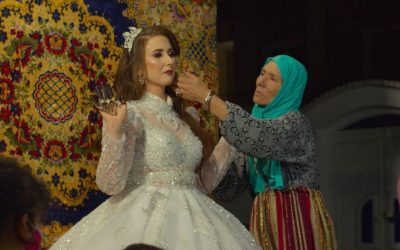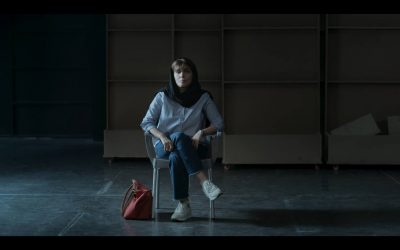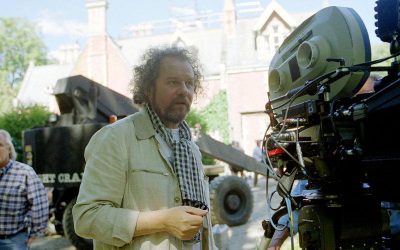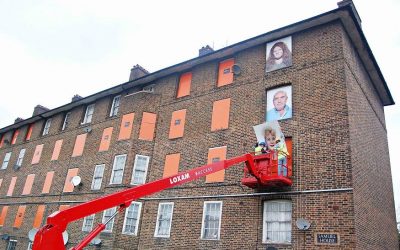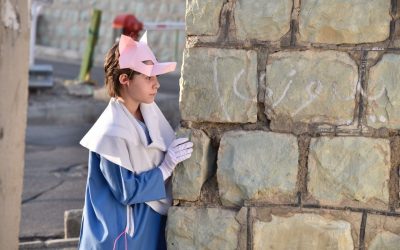
Larissa Sansour
Larissa Sansour was born in East Jerusalem, Sansour (PS/DK) studied Fine Art in Copenhagen, London, and New York. She represented Denmark at the 58th Venice Biennale. Recent solo exhibitions include Whitworth Gallery in Manchester, KINDL in Berlin, Copenhagen Contemporary in Denmark, and Dar El-Nimer in Beirut. She lives and works in London.

Søren Lind
Søren Lind is a Danish author, director, and visual artist. With a background in philosophy, Lind wrote books on mind, language and understanding before turning to art, film, and fiction. He has published novels and short story collections. His children’s books are translated into several languages. Lind screens and exhibits his films at museums, galleries, and film festivals worldwide. His work was shown at the Danish Pavilion at the 58th Venice Biennial. Other recent venues and festivals include the Whitworth Gallery in Manchester, KINDL in Berlin, Copenhagen Contemporary (DK), International Film Festival Rotterdam (NL), and BFI London Film Festival (UK). He lives and works in London.

Mania Akbari
Mania Akbari (b. Tehran, 1974) is an internationally acclaimed intersectional feminist artist, curator, and filmmaker who gained early recognition in the Iranian underground art scene, seeking freedom beyond censorship. During the digital cinema revolution in Iran, she transitioned from a painting career to the camera as a mode of storytelling. Akbari delves into the webs of body politics, by documenting personal narratives through the female gaze as a form of empowerment encouraging critical reflection on bodily oppression and suffering. Concerned with the socio-political traumatisation of female-identifying bodies, Akbari transforms lived experience into an act of resistance by uncovering hidden historical and cultural memory and examines the transgenerational transmission of trauma. Weaving through the relationship between the camera and the body, Akbari identifies the body as a metaphor, as a political message with a revolutionary capacity against the patriarchal status quo. Led by a therapeutic approach, Akbari’s practice is often collaborative and participatory. Akbari works with other women to question the ways their bodies are positioned and valued in society, and to explore the relational confluence of embodied memory and gendered violence. Drawing on accounts of sexual assault, abortion, pregnancy, illness, body image, gender, and sexuality through archival material and biopolitical fiction, her films generate dialogues between past and present, between trauma and reflexive healing. Akbari is committed to highlighting the invisible, with a fierce defiance against heteronormative socialisation. Her distinct filmmaking process reframes how we view personal and national histories and produces radical potentialities for women to regain control of their bodies through sharing, talking, and listening. Selected film awards include Feature Film (Digital Section), Venice International Film Festival (2004) for 20 Fingers (2004); New: Vision Award (2019) at CPH: DOX, Copenhagen, Denmark and FIPRESCI International Critics Award (2019), Flying Broom Festival, Ankara, Turkey for A Moon For My Father (2019).
Mania: Let’s start from here. How did you manage to explore the pathway of expressing thought, emotions, and contemplation through artistic tools such as interdisciplinary arts, literature, animation, and performing arts in front of the camera?
Larissa& Soren: Everything we do starts with a concept, and once we start unpacking and exploring the central idea, the most suited medium tends to present itself. Although film is at the core of our practice, making a film is rarely the starting point for a new project. We come from different backgrounds. Larissa’s background is in fine arts, and she started her career as a painter, while Soren has a degree in philosophy and wrote novels and children’s books before becoming involved in the arts. Bringing different aspects to our collaboration, the medium was never carved in stone. So with any new idea, we always start by exploring its potential before deciding if it lends itself better to sculpture, installation, photography, or film. Or at least, that’s how it used to be. Never having left other forms behind, nowadays we do tend to gravitate towards film by default, maybe particularly because film is a very generous and inclusive discipline that allows for all other modes of expression to take part, from painterly tableaus and sculptural elements to sound, literature, and performance. A decisive turning point was when we started working with dialogue and visual effects as core features of our films. These two features play to our individual strengths, with Larissa’s sculptural and visual ideas realized by our VFX team and Soren’s literary and philosophical approach manifesting themselves through voice overs and dialogue.
Mania: How does the relationship between future imagination and its connection to storytelling about the past shape your works?
Larissa& Soren: Our early works had a documentary approach, used as a way of creating a visual archive of what appeared about to be erased, culture, traditions, food, people. But soon, we started sensing a need for isolating the present as a thing of the past and only took with us the concepts that seemed to remain underexplored in mainstream media and current political dialogue. Futurism and the speculative fiction that comes with it basically gave us the necessary distance to the always turbulently insisting here and now, allowing us to accelerate circumstances and lend a further reaching causality to both past and present. There’s a certain freedom in historicising from a speculative vantage point. Topics that tend to fall through the cracks due to dominant framings of the past and the eternal imminence of the present are suddenly granted center stage and can be unpacked and reshaped outside of the urgency of the immediate.
Mania: Personally, cinema and art have been a part of my realization in a manner akin to cinema therapy, serving as a form of trauma healing. In your works, there seems to be a fusion of imagery, form, language, and visual beauty to uncover the hidden, poignant stories nestled within the collective unconscious, thus rendering a glimpse into the possibilities of the future. What are your thoughts on this matter?
Larissa& Soren: A thread that runs through our work in the past decade is the role of myth and fiction in the creation and alteration of historical narrative. We always consciously obfuscate the distinction between personal, collective and state memory, aiming at consolidating the collective as an essential part of the private and personal while also understanding the necessity of a cohesive national understanding for the purposes of nation-building. We focus a lot on crafting imagery that resonates personally, specifically because it triggers memories of recognisable settings, shared by everyone as a sort of archetype of belonging, often of childhood, experiences everyone identifies with even if they’ve not necessarily ever had them. In that lies a certain fortification of a collective identity, a sense of mutual belonging, and that in itself might just embody a sense of possibility, of hope, despite the general tone of our works often being overwhelmingly bleak at first sight.
Mania: What we see in stories is violence, death, war, and life that resists confrontation with war. How do you feel now about the genocide of the Palestinian people? As a filmmaker-artist whose works revolve around the experience of co-activism, how do you analyze the current situation?
Larissa& Soren: The genocide in Gaza is the most devastating and brutal event of the present era. The casual loss of life defies comprehension. What we are witnessing should leave everyone speechless and traumatized, yet it somehow inexplicably doesn’t. The world has turned upside down, and it exposes the very sad state of our humanity, just as it underlines a dramatic divide between the people and its elected representatives. Advocates for a ceasefire are cast by the political establishment as terror-supporting extremists, yet any extremism resides wholly within the ranks of the very same political establishment. The unwillingness across the board within specifically Western politics to stand up to Israel and – as a bare minimum – ban arms sales to the country, carves out a dystopian and irreparable gulf between decision makers and the people whose will they are supposed to represent. What used to qualify as innocent spin has long since turned into subpar and complicitous lying and agitation, all in the spirit of maintaining a status quo that long since has lost all sense and validity, an old-world power game to the few, acute difference between life and death to all the rest. Gaza has completely undressed the political establishment, its hypocrisy, its doctrines along with its arrogant, condescending and fallacious narratives. There’s no humane defense for the genocidal onslaught we are seeing in Gaza, yet they keep on defending it, if not by actively supporting it, then at least, and just as complicitly, by inexcusable hesitation.
Mania: As you know, over the past seventy years of occupation, human rights, charitable aid, and mainstream media images have constructed a narrative of dependency and condemnation for the Palestinian people. They have perpetually relegated them to the role of victims and established a hierarchical relationship. When we consider the concepts of decolonial feminism and Palestinian activism, we realize that the term “ceasefire” alone is an escape—it signifies seventy years of suppression, occupation, and exploitation. In this regard, how much potential do emancipatory cinema and emancipatory voices have to emphasize these situations and address marginalized voices in opposition to the dominant power structure?
Larissa& Soren: We have always been acutely aware of the hierarchical structures relegating Palestinians to the role of the eternal victim. It was a driving force behind our decision to embrace science fiction and high production value, as an attempt to reframe Palestinians and Palestinian artists and filmmakers, changing the language of addressing political issues, and flipping the power balance. Arab Futurism is steadily gaining momentum as a necessary reaction to existing structures and systems, anti-colonialist at its core, and this gives a much needed platform for counter-narratives with tremendous emancipatory potential.
Mania: Today, the handheld cameras of the people in Palestine are telling the truth and exposing the crimes of Israel. Do you think this harrowing historical experience will change the language of cinema? How do you see the responsibility of artists, filmmakers, and cinema in the face of this atrocity?
Larissa& Soren: The added tragedy of what we are currently witnessing in Gaza and the immense firsthand documentation of unspeakable atrocities is that it’s not new. The volume is magnified, as are the atrocities, but ever since Palestinians and everyone else gained widespread access to handheld cameras, documentation of Israeli violence has been immense. In the early 2000s, Palestinian documentary filmmaking reached a completely new level, exposing daily life and horrors under occupation. It’s all been there for everyone to see, yet here we are, speaking of 7 October as a start of a new era, as if the devastatingly violent continuum preceding that day carries no weight. That said, the evidence of atrocities is not only there, it is also reaching a global public so tuned in to the horrors that it won’t just go away, not this time. In terms of changing cinematic language, handheld cameras already did that. But the tenfold trauma currently being inflicted might spark a change and give a much wider audience to stories that can no longer be suppressed.
Mania: In the current circumstances where the power of art and cinema is in the hands of the capitalist system, how much sustainability do you think independent cinema and independent thought have?
Larissa& Soren:The challenges of independent thought and expression don’t only extend to cinema, but to all artforms as well as journalism. National arts councils being under pressure to adapt governmental reasoning and alternative funding bodies erring on the side of caution puts an enormous pressure on the very institutions put in place to secure an independent arts sector, just as it poses a major and very real threat to freedom of artistic expression. It’s terrifying what’s going on these days, reminiscent of times we all thought we had put behind us for good. Art shows are being closed down, artists are banned, funding is pulled, all in the spirit of toeing the official line out of fear of losing funding. Comprehensive self-censorship ensues, so it’s impossible to even speculate about what’s going on behind the scenes. Another issue is corporate sponsorships of art venues, film festivals, etc. These partnerships invariably prompt venues and festivals to avoid controversy, which often amounts to unseemly attempts to depoliticise events hosting artists and filmmakers driven by political causes. That said, the voices out there in need to be heard are only growing in numbers, and the tides will surely turn.


